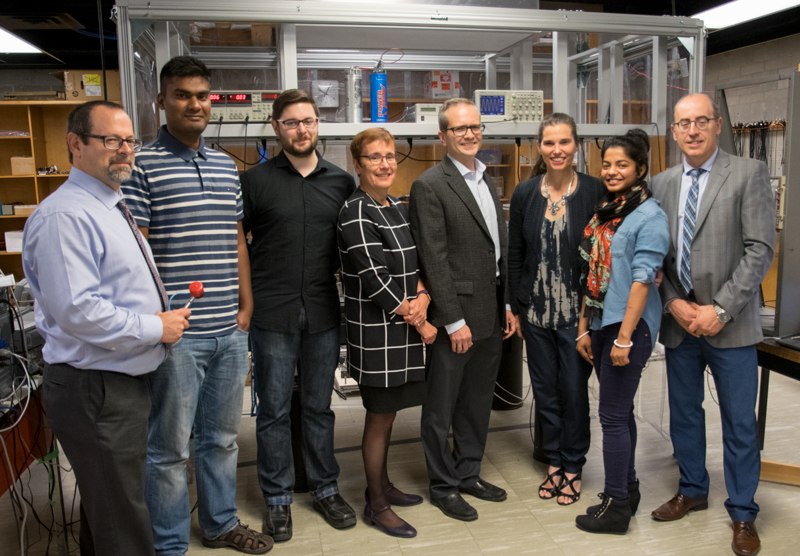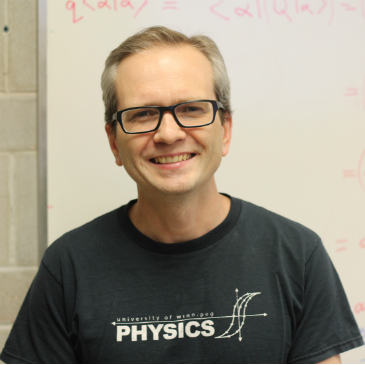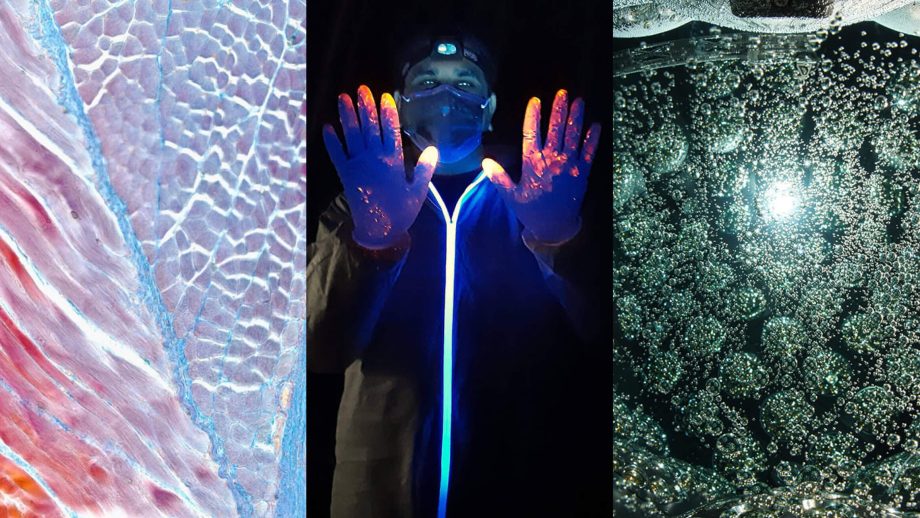
Dr. Doug Goltz, Acting Dean of Science; Shomi Ahmed, student; David Ostapchuk, technician; Dr. Annette Trimbee, UWinnipeg President and Vice-Chancellor; Dr. Jeff Martin; Minister of Science Kirsty Duncan, who was on campus for the announcement today; Moushumi Das, student; and Dr. Jino Distasio, UWinnipeg Vice-President, Research and Innovation; and students, ©UWinnipeg
WINNIPEG, MB – A puzzle about our universe has perplexed physicists for almost a century. It is believed that the Big Bang resulted in equal parts matter and anti-matter being produced, but where did the anti-matter go? UWinnipeg’s physicist Dr. Jeffery Martin is trying to solve this mystery with a team of international partners that have received $15.7 million from Canada Foundation for Innovation (CFI) and a number of other contributing partners.
Martin and his team will develop new techniques to produce and study very slowly moving neutrons called ultracold neutrons, as well as develop new techniques in nuclear magnetic resonance, and magnetic sensing. This research can be used in the field of medicine, such as magnetic resonance imaging and magnetoencephalography, among a host of other high-tech fields. The CFI Multidisciplinary Committee (MAC), noted that Martin’s research has the potential to be Nobel Prize-worthy, and is truly exceptional.
“We are very pleased that Dr. Martin has been awarded funding through the CFI Innovation Fund, along with government, industry and international partners, for this world renowned research program,” said Dr. Annette Trimbee, UWinnipeg President and Vice-Chancellor. “As a medium-sized university, one of the things we do best is collaborate with others to have impact nationally and internationally. It is wonderful that the Government of Canada is investing in cutting-edge discovery research.”

Dr. Jeffery Martin, © UWinnipeg
“The number one resource we will develop are Manitoba’s future scientists,” said Martin. “The project already trains upwards of 30 students throughout the year.”
The funding partners include CFI (the $5,000,000 contribution announced today), Research Manitoba, British Columbia Knowledge Development Fund, Canada’s National Laboratory for Particle and Nuclear Physics (TRIUMF), and Japanese partners. Canadian industrial partners include several local Manitoba companies, such as Precision ADM, Integrated Engineering Software (both in Winnipeg), and Acsion Industries (Pinawa).
The project is an international partnership between Canada and Japan, with Martin being the project leader. The research partners include, University of British Columbia; University of Northern British Columbia; TRIUMF, High-Energy Research Accelerator Organization (KEK, Tsukuba); and the Research Center for Nuclear Physics (RCNP, Osaka). Researchers from the University of Manitoba and Simon Fraser University also collaborate on the project.
“This prestigious grant promotes and supports our science research abilities,” said Dr. Jino Distasio, UWinnipeg Vice-President, Research and Innovation. “We are proud to contribute to Canada’s expert research, fostering excellence and providing an environment of excellence for our students and faculty at UWinnipeg and TRIUMF. This funding builds on a very successful collaborative research program and we look forward to the exciting research that will take place.”
“The Innovation Fund encourages institutions and its researchers to think big and strive to be global leaders by conducting world-class research,” said Dr. Roseann O’Reilly-Runte, President and CEO, CFI. “This funding pushes researchers to aim higher in their pursuits by collaborating across disciplines, institutions and sectors. With this support, institutions can build on their current research strengths and set their sights on accelerating research that will create social, health, environmental and economic benefits for all Canadians.”
Background
The project builds upon a key past investment of Canada Foundation for Innovation, which saw the completion of a new ultra-cold neutron source at TRIUMF.
Canada is currently an international leader in sub-atomic physics and we continue to produce some of the greatest minds and punch well above our weight in terms of contributing to the world’s understanding of our most enduring questions, such as “how did the universe begin?”
Martin’s project will be state-of-the-art and advances in several related technological fields will be made through this cutting-edge research, primarily in cryogenic engineering, atomic and laser physics, magnetic shielding and measurement, and materials and surface science.
The University of Winnipeg gratefully acknowledges the funding received from the Government of Canada Research Support Fund in aid of research infrastructure. Every year, the federal government invests in research excellence in the areas of health sciences, engineering, natural sciences, social sciences, and humanities through its three granting agencies. The Research Support Fund (RSF) reinforces this research investment by helping institutions ensure that their federally funded research projects are conducted in world-class facilities with the best equipment and administrative support available. Please visit RSF.




